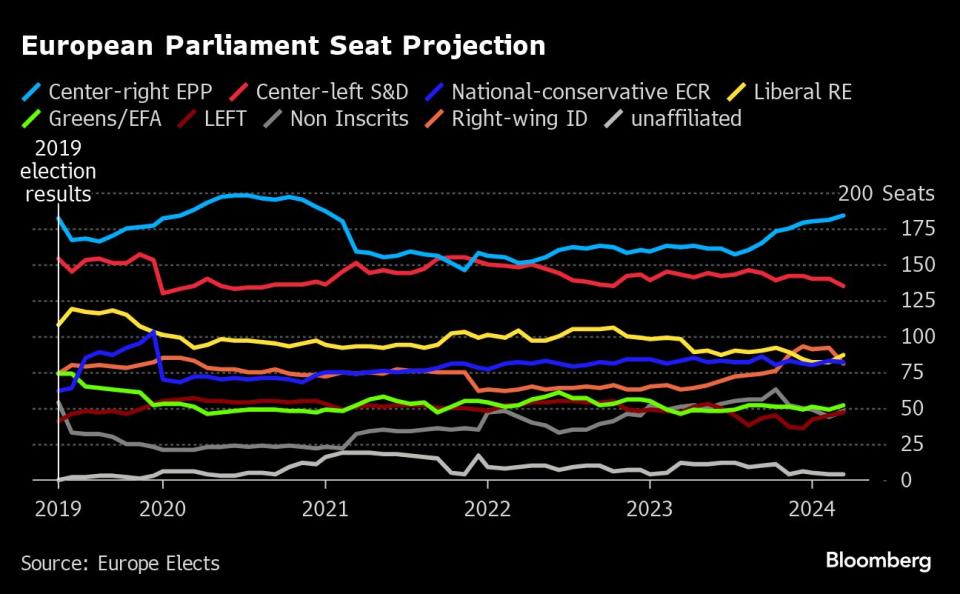Macron Is Gauging Support for a Plan to Install Draghi in the Top EU Job
(Bloomberg) -- French President Emmanuel Macron, who was instrumental in making Ursula von der Leyen the European Commission president five years ago, is now in talks with fellow EU leaders to find a different candidate — such as Mario Draghi — to fill the top job.
Most Read from Bloomberg
US Economy Slows and Inflation Jumps, Damping Soft-Landing Hopes
Malaysia in Talks With Tycoons on Casino to Revive $100 Billion Forest City
Biden’s Gains Against Trump Vanish on Deep Economic Pessimism, Poll Shows
Zuckerberg Asks for Patience as Meta’s AI Push Spooks Market
With less than two months to go ahead of the bloc’s elections, Macron has spoken with premiers including Italian Prime Minister Giorgia Meloni about the possibility of having a technocratic leader of the European Union’s executive arm, such as the former European Central Bank president, according to people familiar with those discussions.
When von der Leyen became the surprise president in 2019 following an agreement between Macron and then German Chancellor Angela Merkel, she vowed to transform the institution into a “geopolitical commission.” But she may have sunk her own chances, a separate official said, by over-politicizing her role.
Von der Leyen is contending with deep dissatisfaction among certain capitals over how she’s run the commission during the past five years, particularly with regard to trade negotiations, the bloc’s climate transformation and relations with the US. And Macron has been openly critical of her performance.
“The commission presidency is there to defend the general interest, so it must not be over-politicized,” Macron said in Brussels last month. “Which, it has to be said, was not at all the case with this outgoing commission.”
A spokesperson from Macron’s office declined to comment. Another official in Rome said that Meloni hasn’t discussed a role for Draghi with Macron.
Officials in Brussels, including within von der Leyen’s office, are uncertain if Macron is genuinely looking for a replacement for the top job, or if he’s putting pressure on her as a ploy to extract concessions from her down the line, said the people, who spoke on the condition of anonymity.
There’s broad consensus that a decision won’t be made until after the June 9 European election, when EU leaders will hash out who will fill the top posts, including for the European Council, the parliament and the foreign policy service. That process is a complicated, back-room negotiation, which weighs geographical balance and, more importantly, which political parties are entitled to the most consequential roles.
Macron will give a broad policy speech at the Sorbonne on Thursday to kick off the campaign season, although it’s doubtful he’ll speak on the topic of institutional jobs.
Regardless of Macron’s maneuvering, von der Leyen is still the clear favorite since she’s the lead candidate for the center-right European People’s Party, which is expected to handily win the most votes in June. Traditionally, that means an EPP candidate would get the commission role.
It’s also unlikely that Germany would support a plan that would remove their country’s commissioner from the highest EU institutional post.
Draghi is seen as a strong profile and his gravitas is still admired in Brussels after saving the euro as ECB president with his “whatever it takes” commitment to shield the common currency. But skeptics point to his age — he’s 76 — his defense of joint borrowing feared among the frugal countries, and strong doubts about whether the EPP would relinquish the post for a technical figure, the people said.
Others have suggested that Draghi could be considered for the European Council job, which is in charge of running the meetings of the 27 EU leaders.
Still, the situation has become more difficult for the commission president not only because she has to combine her campaign obligations with her commission duties, but also because her influential head of cabinet, Bjoern Seibert, is no longer running the day-to-day of the institution and is instead leading her re-election campaign.
It would be difficult for Macron to openly express his support for a German candidate given the difficult electoral environment at home, according to an EPP official close to von der Leyen’s campaign. Macron’s Renaissance party is trailing well behind Marine Le Pen’s far-right National Rally in polls of voting intentions.
EU leaders are scheduled to meet on June 17 to discuss the reshuffle, just a week after the election. Even if von der Leyen is picked by the leaders at the summit, where no consensus is required, she would still face a difficult confirmation vote at the parliament, which must agree by absolute majority.
In 2019, von der Leyen was elected president by only nine votes. And given the expected increase in support for the hard-right parties, her margins will be even tighter this year.
--With assistance from Alberto Nardelli.
(Updates with comment from Rome official in the sixth paragraph.)
Most Read from Bloomberg Businessweek
US White-Collar Job Growth Stalls, Even in Pandemic Boomtowns
Caught Between the US and China, a Powerful AI Upstart Chooses Sides
A Hedge Fund Billionaire’s Cash Helped Fund a ‘Predatory’ Lender
Big Junk Food’s Campaign to Get You Eating Doritos and Oreos for Dinner
Studio Behind Dune Eyes Growth, Even Without a Paramount Merger
©2024 Bloomberg L.P.

 Yahoo News
Yahoo News 



